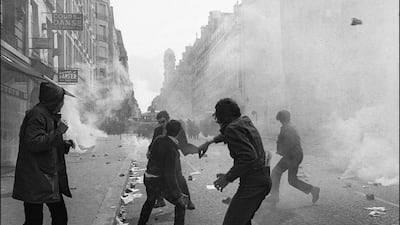In Oleander, Jacaranda, Penelope Lively's account of the first 12 years of her life in Egypt in the 1930s and early 1940s, Cairo is described as "a place of cultural confusion – I was battered throughout my childhood with nationalities and allegiances".
Lively is referring to a melting-pot comprising Egyptian, British, French and Syrian "nationalities" with their Church of England, Muslim, Coptic and Jewish "allegiances". Blue Lorries, Radwa Ashour's beguiling and hard-hitting new novel, showcases the author's native Cairo from the 1950s to 2003. The city remains culturally diverse but Ashour makes clear that her characters' allegiances are political rather than religious. As the years tick by, one conflict or cause begets another and new generations stand up to be counted, allowing the novel to gradually manifest itself as the history of Egyptian protest in the second half of the 20th century.
Ashour’s first-person narrator is Nada, the daughter of a French mother and Egyptian father. When we meet her she is 5 years old and travelling on a packed, stifling train across the desert from Cairo to Upper Egypt to visit her political activist father in prison. Five years later, her father is released but resuming his life as university professor and loving husband and father proves difficult.
The family disintegrates and Nada’s mother returns to Paris but not before explaining to her daughter why France, “an imperialist state”, attacked Egypt back in 1956. Nada is nonplussed when her mother tells her she was against this aggression.
Shouldn’t she support her own country? Her mother clarifies by asking her if she was in favour of her father’s detention. Nada’s emphatic no prompts her mother’s last word on the matter: “So you don’t agree with everything your country’s government does!” With this rejoinder, a lesson is learnt and a seed is sown. We watch as Nada becomes steadily politicised, from relishing “the twofold pleasures of speaking my mind and outwitting my mother” to engaging as a young student then mature adult in debates and dissent against social iniquity and government decrees.
Structurally, Blue Lorries assumes the form of a long backward glance. Nada, as an older woman, traces the jagged course of her life, one that covers her various acts of rebellion and those around her. A trip to visit her mother in Paris takes her to the heart of the '68 movement and as she listens to one participant's daily updates of demonstrations and strikes, tear gas and house raids, she becomes smitten by both tales and teller.
Back in Egypt, she starts school and “ravenously, ceaselessly” devours books on history, sociology and politics. University involves reconciling academic acquirements with on-campus activism. Student sit-ins and wall newspapers lead to imprisonment and a fleeting taste of what her father endured.
Ashour intercuts Nada’s recollections with sections on the tedium and brutality of prison life. Snippets from security case files and contributions from Michel Foucault and the English philosopher Jeremy Bentham are edifying, but more illuminating are the poems and memoir extracts from some of Egypt’s celebrated political detainees. We also learn that the novel’s eponymous blue lorries are vehicles for transporting prisoners – their tiny metal grilles restricting airflow and limiting visibility for those inside, thus “keeping them that much more tightly in bonds”.
This shifting from Nada’s flashbacks of a liberated and essentially lucky life to stories of cruel incarceration is effective in helping variegate what might otherwise have been only an intermittently interesting narrative. It isn’t only content that Ashour likes to contrast. As Nada grows up, we range from child’s-eye viewpoint (as expertly managed as the technique perfected by Virginia Woolf) to more sarcastic and critical adult observation.
Feistiness blooms into defiance, disobedience at home turns into insubordination towards the authorities. Paris unrest in ’68 is juxtaposed with student clampdowns and civilian repression in Egypt in the 1970s and 1980s. When Nada’s twin brothers undergo their political awakening and find their own causes worth fighting for in the 1990s, we see more contrasts between their day and hers but also come to realise that each successive protest movement is simultaneously a sign of the times and history repeating.
As Nada’s chronicle comes to a close, her passionate and at times angry voice starts to betray notes of regret and sadness. She takes stock of fallen comrades, lost lovers and all those past battles, but rather than succumb to the depression that sporadically plagues her, she remains upbeat – a fighter to the last: “Life in general – in our part of the world, at any rate – combines the funny with the sad, mixing the momentous with contrasting humour and whimsy.” Such bittersweetness infuses Nada’s life and, by extension, Ashour’s absorbing novel.
Malcolm Forbes is a regular contributor to The Review.

